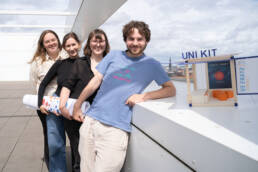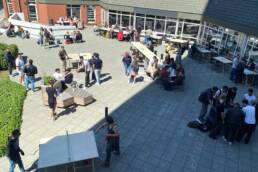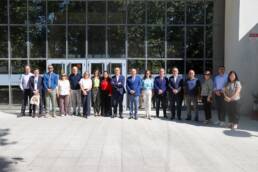What is an Engaged Region? An engaged region builds on a strategy to develop innovative regional ecosystems that supports Prosperity in terms of well-being and social cohesion; Resilience in terms of adaptive and innovative capabilities; and Sustainability in terms of a circular and inclusive economy. The concept also includes embedded learning and collaboration networks in the region that work together to identify and tackle regional/societal challenges. Professor Willem Foorthuis and researcher Anu Manickam from ENGAGED partner Hanze University of Applied Sciences present an interesting Dutch case about being engaged in the region.
Case: Dutch Engaged Region
In the Northern Netherlands context, place-based cooperatives have emerged that focus on local and regional challenges and opportunities. These cooperatives differ from the more traditional socially or business driven cooperatives which are also abundantly present in our region, which has a long history of cooperative networks and organizations. The place focused cooperatives in the Groningen-Assen urban field are called Gebiedscoöperatie (area cooperatives) when they are focused on a local area and there are a number of these cooperatives established and in development. Next to this, a regional cooperative, Regiocoöperatie, was established to support Gebiedscoöperaties and to develop initiatives at the regional level.
Each area has one or more Innovation Workplaces (IWP) focussing on challenges identified by the local stakeholders. Stakeholders from industry (especially small and medium sized enterprises), local government, education and civil society come together, share their knowledge and resources to co-create and implement solutions for the chosen challenges.
The Dutch engaged model is motivated by the limited innovation capacities (R&D resources) in the region and therefore leverages students and researchers as a driving force to generate new knowledge and innovations in collaboration with other stakeholders. Together, students, researchers and other stakeholders become learning communities focused on regional challenges.
Engaged University
Societies are faced with multiple pressures on different fronts, namely, ecological, social, economic and political. Climate change and disinformation are only two such examples. The urgency of these multiple and parallel challenges makes it more urgent for Universities to focus their efforts to engage and be engaged with their stakeholders. The local region is an important context of engagement for Higher Education Institutes (HEIs), and for the region, HEIs are important sources of knowledge, training and innovation.
The key role of an engaged university is one of development – developing regional knowledge and innovation ecosystems together with the regional partners and aligning its mission to policy at different (EU, national, regional) levels. EU Policy for example is facilitating the engaged universities principle through its main Framework Programme for Research and Innovation, Horizon Europe, that emphasizes the need for research and innovation (R&I) to tackle global challenges and support uptake of such solutions into markets and society.
In the Next Newsletter: The role of the European ENGAGED University (EEU) in community and economic development by ENGAGED partner Waterford Institute of Technology from Ireland.
Related Posts
July 10, 2025
STARS EU: An intercultural pavilion for a European campus
The Interspace project, developed by students from nine European universities,…
July 7, 2025
“Interspace – O(ut)er Campus” begins with the final project presentation at the Bremen University of Applied Sciences
The project will evolve into a BIP, with its first phase to be developed within…
July 7, 2025
UAMD delegation visits Bragança Polytechnic University to strengthen strategic collaboration
The meeting served to bring together positions in areas as important as…




